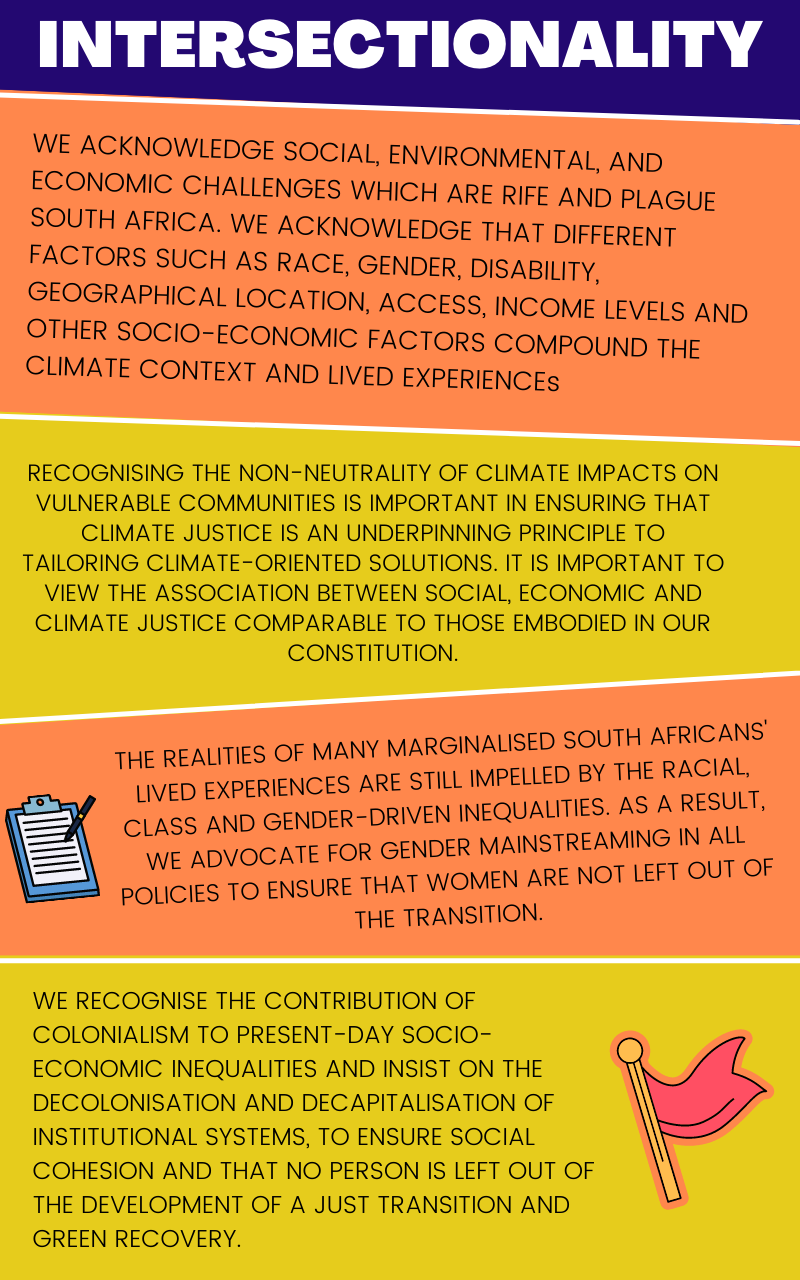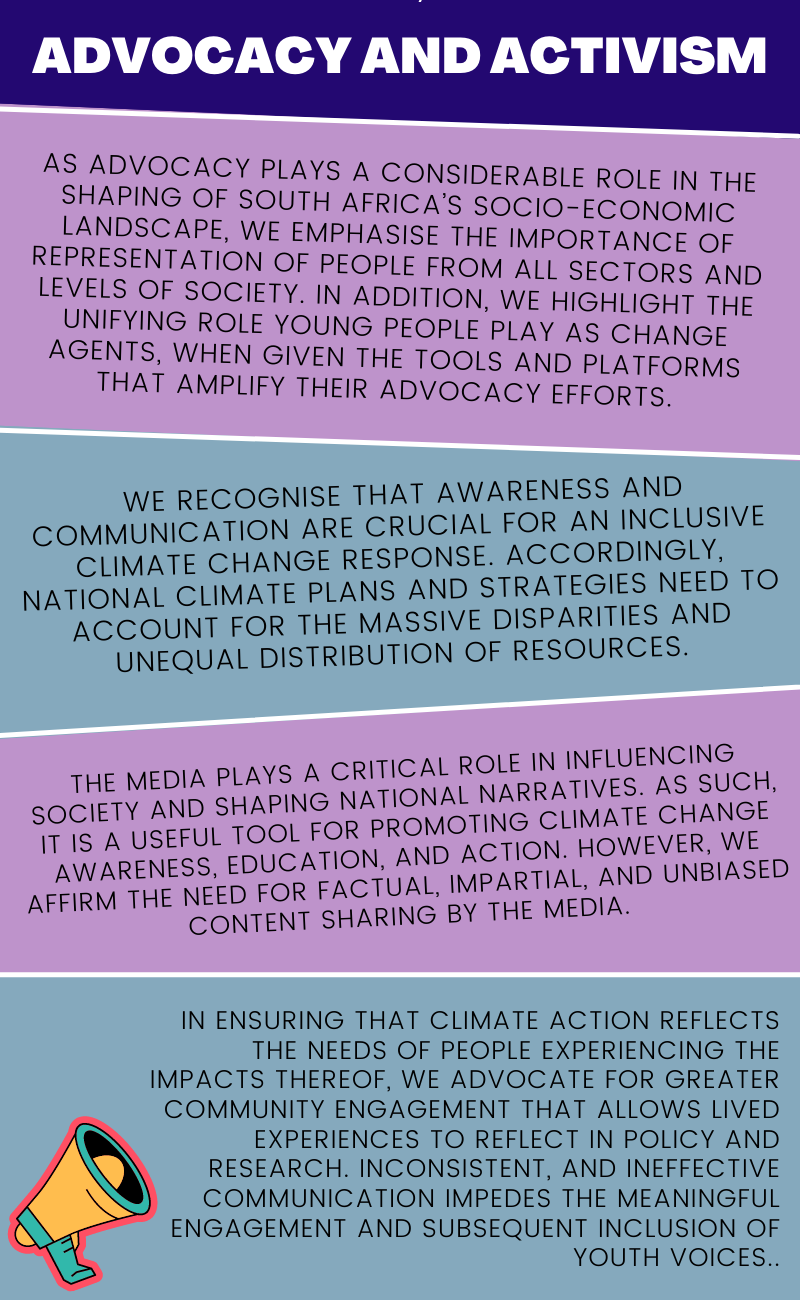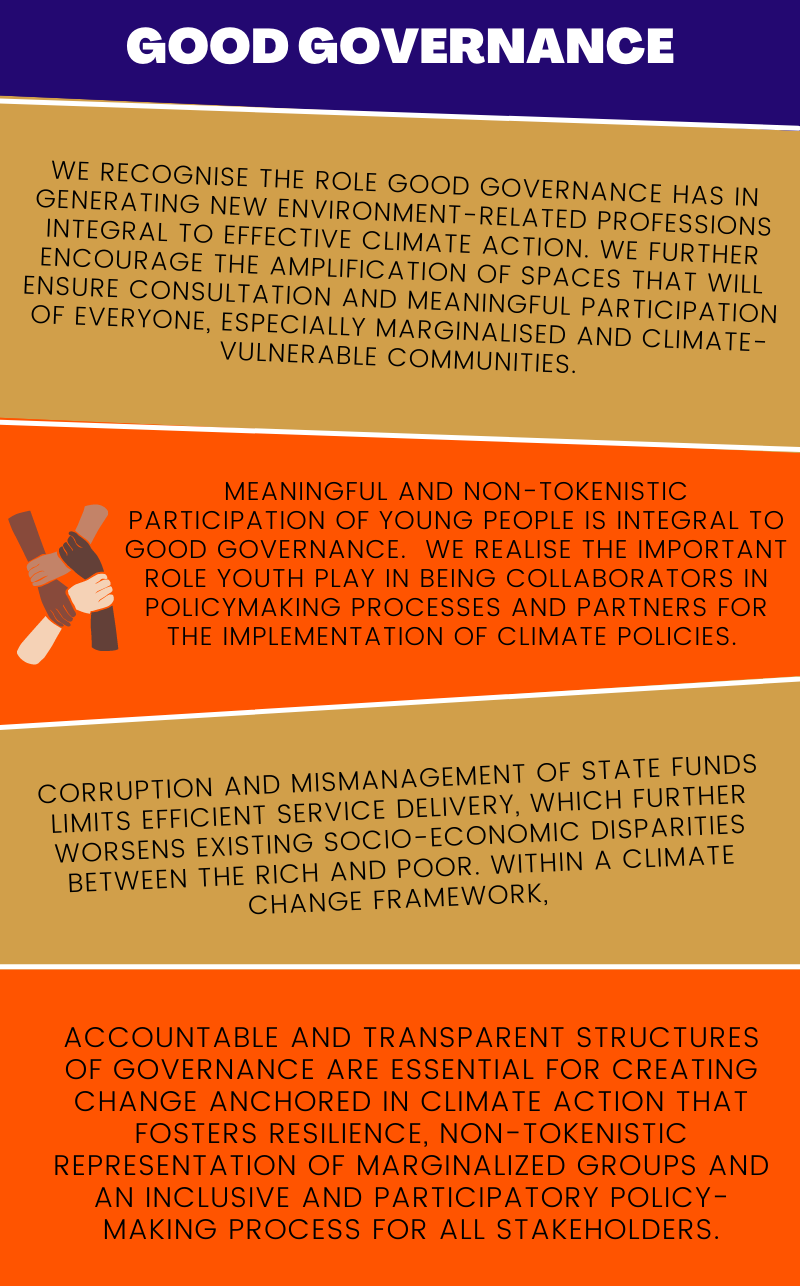
The SA YCAP
For young people, by young people.





Summary
The South African Youth Climate Action Plan (SA YCAP) is a living vision document that is constantly updated to reflect the views of young people from across the country. It stands as two essential things: a call to national stakeholders to honour their climate pledges; and a framework to inspire youth-led climate action for a just, sustainable, and resilient society.
The youth of South Africa recognise the urgent need to accelerate climate action to limit global warming to 1.5°C, which requires greater ambition from all sectors of society, nationally and internationally.
The YCAP is underpinned by the principle of upholding human rights, with special emphasis on promoting intersectional and inclusive climate action. It is divided into five pillars: intersectionality; advocacy and activism for climate action; good governance; systemic change; and environmental sustainability.
Shaped by five key pillars
Intersectionality acknowledges that different factors, such as race, gender, disability, geographical location, income levels and other socio-economic conditions compound the climate crisis - impacts are disproportionately felt by the most vulnerable and disadvantaged. Recognising this, it is important to ensure that climate justice is an underpinning principle when tailoring climate-oriented solutions.
Many marginalised South Africans are still constrained by racial, class and gender-driven inequalities, much of which results from the contribution of colonialism to South African society. It is important to highlight these systemic issues to ensure that no-one is left behind. The SA YCAP advocates for gender mainstreaming in all policies to ensure women are not left out of the equation, and for the decolonisation and decapitalisation of institutional systems to ensure social cohesion.


Intersectionality



Advocacy & Activism



There are five main elements within this pilar: advocacy, communication and awareness raising, community and civil society, education, and media.
Advocacy plays a significant role in shaping South Africa’s socio-economic landscape, and it is important to have representation of people from all sectors and levels of society. Young people play a vital role in unifying people to become agents of change when given tools and platforms to do so. The SA YCAP stresses that advocacy should be encouraged in educational institutions, and that youth should be educated and capacitated with the skills and resources to become active agents of change within their communities. Improving digital literacy and reducing the digital divide is a key step in achieving this. Youth also need to be included at all stages of policy development and within decision-making spaces.
Awareness and communication are crucial for an inclusive climate change response and those most impacted often have the least access to knowledge and resources. The SA YCAP advocates for an improvement in communication strategies and techniques: information about climate change, including news and government information, needs to be accessible and user-friendly, and shared across a wide range of mainstream and traditional media; and a national climate change toolkit should be developed.
Communities and civil society play an important role in ensuring that climate action reflects the needs of those most impacted by it, and that this is supported by policy and research. Youth play a crucial role in uniting different sectors of society and the SA YCAP advocates for the capacitation of community based organisations, intergenerational dialogues and engagement with indigenous communities, and the inclusion of vulnerable and marginalised groups in policy development, including youth.
Education is fundamental to tackling the climate crisis and innovative and collaborative models of teaching need to be adopted. The SA YCAP advocates for a comprehensive national climate education plan which would include developing a national climate change curriculum, establishing climate education programmes, integrating contributions from indigenous people, capacitate teachers, and integrate green skills and training into vocational colleges.
The media plays a significant role in influencing society and shaping narratives and it is imperative that factual and impartial content be shared by the media. The SA YCAP advocates for collaboration between media and the scientific community to ensure the production of accurate and understandable content, the use of storytelling to show the impacts of climate change, and media training workshops.




Good Governance



Good governance is central to climate action and should be anchored by green governance that aims to institutionalise the rules, practices and policies that promote sustainability and green recovery.
It is impossible to effectively use climate finance when leadership structures across all sectors of government are institutionally corrupt, and the mismanagement of state funds limits service delivery, further worsening existing inequalities and negatively impacting resilience.
In terms of leadership and governance, the SA YCAP recognises that the meaningful inclusion of youth is integral to good governance and advocates for Youth Climate Advisory Councils to be established at national, provincial and local levels. The SA YCAP advocates for better coordination between stakeholders including: meaningful dialogues between ward councillors and their communities, fostering better public-private partnerships, increasing stakeholder training, and project implementation. The SA YCAP also advocates for a national climate change finance strategy, reiterates the zero tolerance statements on corruption, and calls for fair and just service delivery.
The SA YCAP recognises that accountability and transparency are essential for climate action, and advocates for more integrated reporting on the environmental, social and governmental criteria as a means for business, an improvement on evidence-based policymaking, and for greater commitment to climate action through corporate social responsibility. The SA YCAP also encourages a coordinated and cooperative approach in dealing with lack of accountability and achieving sustainability.


Systemic Transformation




The SA YCAP recognises that extensive systemic transformation is needed to achieve a carbon resilient society.
A just transition to a decarbonsied economy is essential, with a focus on decarbonising and decentralising the production of clean, renewable energy. Workers from all sectors, particularly energy, need to be re-skilled and up-skilled and the SA YCAP advocates for a training framework and transition plan for energy workers, increased funding opportunities for STEM education, the capacitation of young entrepreneurs to build green businesses, and support for community-driven renewable energy projects. There should be a divestment from the fossil fuel industry and investments redirected to renewable and sustainable alternatives and the carbon tax should be used to fund community-based projects.
A community-centred approach is needed in the development of sustainable and renewable energy and the SA YCAP advocates for the prioritisation of renewable energy infrastructure, funding for renewable energy projects, energy and water-efficient technologies, and for policy to support independent renewable energy production. Promoting sustainable industries is essential and the SA YCAP advocates for legislation to curb unsustainable production and manufacturing patterns and for investment into sustainable local manufacturers. Resilient and sustainable settlements need to be established, supporting the sustainability and adaptive resilience of urban and rural spaces. New urban development plans should be people-centred, eco-centric and climate risk-conscious, and spatial planning should redress historical spatial and accessibility inequalities.
Transport systems need to be made fit-for-purpose and should be both environmentally friendly and socially appealing. Alternative and green transport infrastructure is needed and public transport needs to be safe, affordable and accessible. To build a sustainable society, principles and practices that foster the circular economy need to be followed. The SA YCAP advocates for decoupling economic growth from environmental degradation and traditionally consumerist and capitalist practices is essential, and this needs to be regulated, supported through capacity building, and done at a local level. Waste management is central to sustainability and the SA YCAP calls for a ban on single-use plastics, the establishment of wide-scale recycling, the facilitation of large-scale composting, and better regulations for water, air and land pollution.
Science and innovation is at the forefront of the Fourth Industrial Revolution and an enabling environment needs to be created for South Africa to become a pioneer in the digital age. The SA YCAP advocates for a collaborative approach to science, support for science communication programmes, the establishment of centres of excellence in renewable and exploratory energy sectors, and increased for STEM and career opportunities.



Environmental Sustainability


The protection of natural resources is central to environmental sustainability. South Africa is a water-scarce country, and it is crucial that significant adjustments are made to water resource management - legislative frameworks need to be strengthened, infrastructure needs to be improved, and more effective monitoring and reporting needs to occur. Measures to counteract air pollution also need to be implemented including institutional collaboration, improved monitoring, and incentivising businesses to transition to renewable energy. Greater measures are also needed in the mining industry with greater mitigation efforts to reduce environmental damage.
Biodiversity and climate change are interconnected and more effort is needed for the rehabilitation, protection and management of ecosystems. Biodiversity policy and programmes need to be strengthened and collaboration is needed with marginalised groups and communities to create bottom-up approaches to support marine and wildlife protected areas. Nature-based solutions and indigenous knowledge systems need to be utilised and the intrinsic connection between human well-being and nature needs to be appreciated.
Agriculture is particularly threatened under climate change and immediate action is needed to embrace sustainable production models. Synthetic fertilisers need to be reduced, collaborative approaches are needed between government and farmers unions, and better capacitated extension officers are needed. The uptake and adoption of sustainable technology to encourage eco-concious and climate-smart farming should be incentivised. Urban food gardens and rainwater harvesting systems need to be established, with collaboration between local farmers and business further supported.







